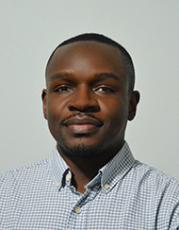Joseph Kakande PhD, 2012
Network Engineer, Meta

Having the ORC brand on my resume made a real difference in a competitive hiring environment. There’s a very clear join between the knowledge I gained from my Southampton PhD and my job today at Meta.
What were your highlights of studying at the Optoelectronics Research Centre (ORC)?
I think a truly successful PhD is one that’s enriching for you both professionally and personally. I certainly had that in Southampton. I had mentors that I could trust and peers that were engaging and that understood my work.
I’m from Uganda in East Africa and moved to the UK for my studies. The ORC has a very international flavour and that was very important to me. I arrived knowing that the centre had a hugely impressive track record in attracting funding, excellent research facilities and opportunities to travel for projects.
I really enjoyed that the ORC really lets you loose to do your research. There’s an intellectual freedom alongside support from mentors who are really invested in you and care about your success. Without that environment, I don’t think I would have managed the research that I did.
What research topic did you focus on during your PhD at Southampton?
Today's high-end communication systems rely on sending data over great distances and during transmission, particularly over very long stretches of fibre, these light signals become degraded. We were looking to build technologies that clean up this noise and effectively increase the reach of these systems, thereby driving down the cost of high-end communicating over high-bandwidth communication systems.
Our particular focus was non-linear optical fibres that use clever filtering to separate a signal from the noise. I worked closely with Professor David Richardson and Professor Periklis Petropoulos, and we built some demonstrations that achieved over 100 gigabits per second. This was a pretty high data rate for the time and we were featured in Nature Photonics. We also had multiple papers on the subject appear at the Optical Fibre Communication (OFC) Conference, the world’s leading conference in the field.
How did your education at Southampton prepare you for your future career?
I moved straight into another research environment after graduating and having the ORC brand on my resume made a real difference in a competitive hiring environment. Studying at Southampton equipped me for my career but it definitely also helped me get a foot on the job ladder.
There’s a very clear join between the knowledge I gained from my Southampton PhD and my job today at Meta. There are technical skills like coding that I first picked up through my postgraduate research.
How has your career developed since completing your PhD at the Optoelectronics Research Centre?
When I finished in 2012, I joined Bell Labs in New Jersey. I was involved in research and development in advanced fibre transmission and extending concepts that had started in Southampton.
Looking back, I remember that the ORC was a really entrepreneurial environment that encourages researchers to branch out and do their own thing. That made a big impression on me and after five years at Bell Labs I moved on to start my own company. The start-up was rethinking network infrastructure and it was a very interesting challenge. I eventually decided that I wanted to learn a bit more about building networks at scale and that led me to join Meta in 2019.
Meta has billions of users that use its services every day, including WhatsApp and Instagram, and some of these services are very data intensive. Global network infrastructure is critical to enable these applications and I am part of the team that designs, operates, troubleshoots and grows this optical backbone network.
What tips would you give to current students at the Optoelectronics Research Centre?
I would advise students to not worry about making perfect decisions at the start of a PhD. You might be surprised how little you know when you set out but the reality is your study and continuing career will likely look very different from what you envision at the start of your postgraduate research.
The important thing is to is to use the time to learn and grow as an individual. Research skills transfer globally. Personal skills transfer globally. Find a research topic that others care about, go and do a good job at it, and people will notice and reward you for it.
Southampton is a fantastic place to do research. It’s a great town with a supportive community and London isn’t that far away. The ORC is a well-funded environment with world-recognised experts to learn from. I could not recommend it highly enough.